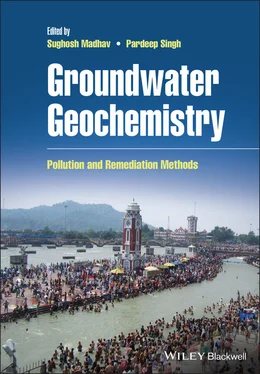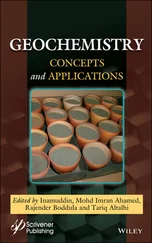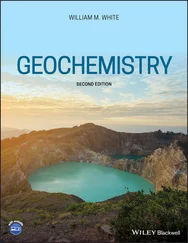Description: Hoboken, NJ : Wiley‐Blackwell, 2021. | Includes index.
Identifiers: LCCN 2021001375 (print) | LCCN 2021001376 (ebook) | ISBN 9781119709695 (hardback) | ISBN 9781119709718 (adobe pdf) | ISBN 9781119709701 (epub)
Subjects: LCSH: Groundwater–Pollution. | Groundwater–Purification. | Groundwater–Quality.
Classification: LCC TD426 .G7145 2021 (print) | LCC TD426 (ebook) | DDC 628.1/14–dc23
LC record available at https://lccn.loc.gov/2021001375LC ebook record available at https://lccn.loc.gov/2021001376
Cover Design: Wiley
Cover Image: Courtesy of Sughosh Madhav
Water is the most significant universal component which is necessary for all living organisms, and this is why it is known as the matrix of life. Water has a finite presence on this planet, and freshwater is even more limited. The entire freshwater supply is only 2.7% of all water present on the Earth’s surface. Out of the total freshwater, 68% is frozen in the form of ice and glaciers, 30% of it is groundwater, and a very minimal amount of about 1.3% is found on the Earth’s surface in lakes and rivers. This is the reason why dependence for portable and usable water is met through groundwater resources in most parts of the world. In the past few decades, this scant resource has arrived at a crisis position because of overexploitation and intense irrigation. Groundwater scarcity and pollution remain among the most significant challenges faced by developing countries. Freshwater demand tremendously increased with population, urbanization, and intense irrigation. Because of the insufficient supply of surface water, which is aggravated by easy contamination through sources like untreated wastewater, urbanization, and industrialization, groundwater is preferred for many people in developing countries like India, where the majority of the population uses groundwater resources for household consumption, manufacturing, and farming purposes. Depletion of the water table owing to overexploitation for irrigation and urbanization, groundwater pollution, drying of aquifers, waterlogging, and saltwater intrusion are some of the major issues which need immediate attention. Water scarcity is further aggravated by a looming threat of climate change. With only minimal water present as groundwater, it requires greater attention paid to its management and conservation.
It is essential to recognize the hydrogeochemical features of groundwater and the evolution of the hydrogeochemical process for sustainable development and effective groundwater management. Groundwater quality of any area is a function of physicochemical factors that are significantly governed by geological configurations and human conduct. Natural aspects that have direct control over water composition incorporate rainfall model and quantity, geological characteristics of the basin and aquifer, climatic features, and various water–rock interface procedures in the subsurface environment. Human behaviors that manipulate the water composition comprise management of domestic and industrial effluents and mining and farming actions. Groundwater quality plays a vital role in groundwater protection and quality conservation. Hence, assessment of the groundwater quality is essential not only for use by the present generation but also for future consumption. Therefore, knowledge of the hydrochemistry of water is necessary for assessing groundwater quality in any basin or population area, which affects the suitability of water for domestic, industrial, and irrigation purposes.
Through this book, we have tried to address all the impending problems with a certain degree of solutions to manage and conserve this scarce resource. The book covers holistic issues related to groundwater resources associated with its quality and quantity. The various chapters will help to understand the hydrogeochemistry of groundwater resources with the impact of agriculture, domestic, municipal, and industrial pollution in altering the geochemistry. We will also try to track the quantitative and qualitative challenges faced by water scarcity in the era of rapid urbanization and industrial development. The book also talks about different organic, inorganic, and emerging contaminants causing potential threats to groundwater quality. The focus is also on saltwater intrusion in coastal areas and salinity issues, as well as waterlogging due to overdrafting and pumping. New trends in groundwater contamination remediation measures will help researchers working in water conservation and management.
It will be useful for not only researchers but stakeholders from all sectors, and along with students, industries and governmental agencies who are directly or indirectly associated with groundwater research and management. As for the courses, based on the major topics listed in the features and contents section of this document, a critical discussion can be done in academic and research fields covering broad areas like hydrogeochemistry, groundwater pollution, modelling aspects, remediation, and management. It focuses on groundwater resources challenges, including different sources of ions in groundwater, new remediation measures, and case studies for better understanding of groundwater resources.
This book contains both practical and theoretical latest and broad aspects of groundwater contaminants, their sources, and remediation. An emphasis has been made on the recent research of groundwater resources and their impact across the globe. This book will be useful for undergraduates, university students, and researchers, mostly working in hydrogeochemistry, water pollution, and the effects of anthropogenic activities on groundwater systems. The book is a humble attempt to reflect upon the various aspects of groundwater hydrogeochemistry, pollution, and remediation measures, hoping that it would be a significant addition to the available literature on the topic. The contributors to the book, having different backgrounds, provide holistic literature on the topic, imbibing diverse approaches and perspectives. We express our sincere gratitude to all the contributors and publishers to produce a remarkable and meaningful edited volume on an important issue.
Dr. Sughosh MadhavDr. Sughosh Madhav is presently working as Assistant Professor on a guest basis at Shaheed Bhagat Singh College, University of Delhi. He has obtained his master’s degree in Environmental Sciences from the Department of Environmental Science, Banaras Hindu University, Varanasi, India. He earned his doctorate from Jawaharlal Nehru University, New Delhi, India. The area of his doctoral research is the environmental impact of textile effluents on groundwater and soil quality. He has published various research papers and book chapters in environmental geochemistry, water pollution, and wastewater remediation.
Dr. Pardeep SinghDr. Pardeep Singh is presently working as Assistant Professor in the Department of Environmental Science, PGDAV College University of Delhi, New Delhi, India. He has obtained his master’s degree from the Department of Environmental Science, Banaras Hindu University, Varanasi, India. He has obtained his doctorate from the Indian Institute of Technology, Banaras Hindu University, Varanasi, India. The area of his doctoral research is the degradation of organic pollutants through various indigenous isolated microbes and by using multiple types of photocatalysts. He has published more than 45 papers in international journals.
Narsimha AdimallaSchool of Environmental Science and Engineering Chang'an University Xi'an, China
Pinki Rani AgrawalAcademy of Scientific and Innovative Research (AcSIR) CSIR‐National Physical Laboratory campus New Delhi India
Читать дальше




